 Loading... Please wait...
Loading... Please wait...Products
- Solar Panels
- Solar Panel Kits
- Solar Generators
- Inverters
- Inverter Monitoring
- Inverter Accessories
- Balance of Systems
- Racking and Mounting
- Rails
- Flashings
- Splice Kits
- Stopper Sleeves
- Conduit Mounts
- Attachments
- Brace Assembly
- Base Mount
- Brackets
- Bolts
- Clamps
- Caps
- L-Feet
- Washers
- Skirt
- Lugs
- Tilt Legs
- Hooks
- Stand-Offs
- Ballast Bay
- Top of Pole Mount
- Side of Pole Mount
- Flush Mount Kits
- Ground Mount Kits
- Roof Mount Kits
- Hardware Packages
- Wire Management
- Batteries
- Battery Accessories
- Charge Controllers
- Tools and Supplies
- View All Products
Solaris Blog - SolarEdge StorEdge
Hybrid Solar Systems: What You Need to Know
Posted by Brandi Casey on 3rd Aug 2020

With the rising utility costs and power outages in the United States, it is no surprise that more home and business owners are turning to hybrid solar energy systems. Hybrid systems are grid tied, meaning your solar energy system connects to your utility provider’s power-line. Unlike traditional grid-tied systems, hybrid systems work with compatible hybrid inverter and battery combinations in order to provide battery backup power for systems tied to grid power. During the day, your solar system harvests energy from the sun to power both your home and charge your battery backup unit. You can then draw from this power at night when your system is not producing power or in the event of a power outage.
Hybrid solar energy systems utilize different battery technology than traditional off-grid battery backup units. Lithium battery technology allows for more capacity to fit into a single battery backup unit, these batteries require the communication technology of a compatible inverter unit in order to run the system. This is important to consider when planning for your hybrid project, we will go into detail on some of these pairings as we go along. For those looking to add onto an existing system, we will also outline how to determine if your current inverter setup is ready for battery backup, and the steps to take if it is not.
In our assessment of hybrid solar energy systems, we will be analyzing the following hybrid solar energy options:
- Enphase Energy IQ Microinverter and Ensemble Encharge Battery System
- OutBack SkyBox Hybrid Inverter and Discover AES Battery System
- SMA Storage Hybrid Inverter and BYD B-Box Battery System
- SolarEdge StorEdge Hybrid Inverter and LG Chem RESU Battery System
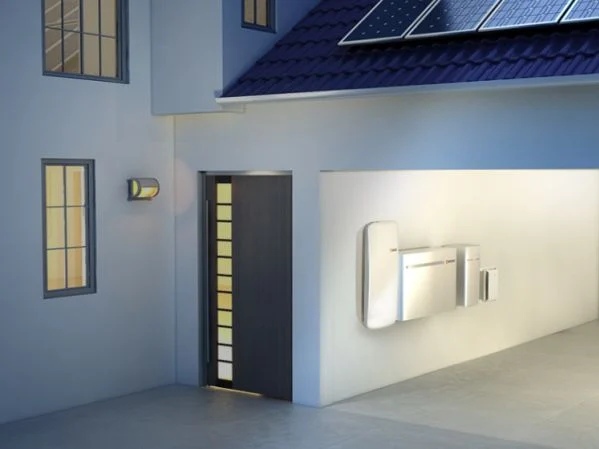 While there are other hybrid pairing available on the
market, these systems represent a few of the most popular, reliable, and affordable
systems on the market. Hybrid solar energy systems require compatible software
between the inverter and battery technologies. The benefits of hybrid energy
systems over on-grid systems is that they
can provide for energy when your
system is not producing energy. In order to meet safety compliance standards,
all on-grid solar energy systems turn off in the event of a power outage, some
people are surprised to find out that their solar energy system cannot provide
them with power in these situations.
While there are other hybrid pairing available on the
market, these systems represent a few of the most popular, reliable, and affordable
systems on the market. Hybrid solar energy systems require compatible software
between the inverter and battery technologies. The benefits of hybrid energy
systems over on-grid systems is that they
can provide for energy when your
system is not producing energy. In order to meet safety compliance standards,
all on-grid solar energy systems turn off in the event of a power outage, some
people are surprised to find out that their solar energy system cannot provide
them with power in these situations.
Off-grid systems require a number of batteries and oftentimes a great deal of maintenance, and storage space. In addition, the batteries need to be replaced once every 3-5 years on average. Lithium battery technology has an average 10-year warranty period, and no maintenance requirements. Inverter and battery technology combine to give you easy to read information regarding the output of your system, how much power you pull from the grid and more. There are a number of unique offerings across the various system solutions, be sure to see which offerings best match your hybrid needs.
In this overview of hybrid solar systems, we will be looking at the following:
- Hybrid System Options (Highlighted above)
- Hybrid Inverter and Battery Cost Comparison
- Solaris Recommendations
Hybrid System Options
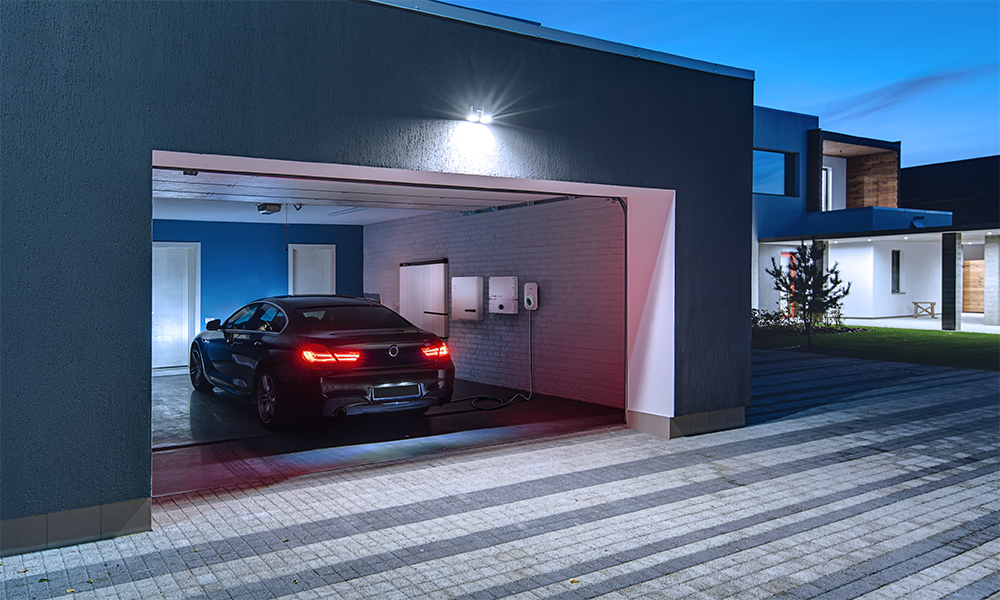 As outlined above, there are a number of benefits to installing a hybrid energy system. Just as with any solar energy system, it is important to select equipment that works for your current and future energy needs. All the hybrid inverters on this list can be installed prior to battery backup installation, this means you can install your system with the solar panels, inverters and necessary equipment then add the battery onto the system in the future. This is beneficial for budgeting for your project. If you are not currently considering battery backup power for your system, you may want to purchase a hybrid inverter to have the option to add onto the system in the future if your energy needs change.
As outlined above, there are a number of benefits to installing a hybrid energy system. Just as with any solar energy system, it is important to select equipment that works for your current and future energy needs. All the hybrid inverters on this list can be installed prior to battery backup installation, this means you can install your system with the solar panels, inverters and necessary equipment then add the battery onto the system in the future. This is beneficial for budgeting for your project. If you are not currently considering battery backup power for your system, you may want to purchase a hybrid inverter to have the option to add onto the system in the future if your energy needs change.
Likewise, you may elect to install a single battery with the expectation to add additional solar or battery backup power in the future. Lithium batteries are limited to a number of parallel battery units just as the solar panels to your inverter are, some of these systems allow for more potential battery backup power, while others cap the systems at two. For systems between 5-16kW, approximately 10kWh of backup power should be sufficient. However, if you have higher energy pull and more need for battery backup power, you may want to consider batteries that can be further expanded with need beyond the 20kWh limit of some batteries.
Therefore, it is important to select both the correct inverter and battery for your particular project. We will highlight some of the main features, benefits and limitations of each system. We will wrap up the comparison with an average cost presentation for the inverter and batteries so you can get an idea of where each technology stands on the inverter and battery technology alone. Additional articles are included for further research into the various technologies and helpful links for those researching solar energy systems.
Quick Links - Section Products and Downloads
| Inverter |
Battery Option(s) |
Products | Specifications |
Enphase IQ Micros |
Enphase Ensemble |
Inverter Options: - IQ7 - IQ7PLUS - IQ7A - IQ7X Battery Options: - Encharge 10.54kW - Encharge 3.36kW |
Inverter Specs: - IQ 7 & 7PLUS Specs - IQ7A Specs - IQ7X Specs Battery Specs: - Enphase Encharge 10 Specs - Enphase Encharge 3 Specs |
OutBack SkyBox |
EnergyCell PLC, PL and OPzV Batteries  |
Inverter Option: - SkyBox 5kW Battery Options: - OPzV 1265Ah - OPzV 1782Ah - OPzV 2376Ah |
Inverter Specs: - OutBack SkyBox Specs Battery Specs: - Discover 1265Ah Specs - Discover 1782Ah Specs - Discover 2376 Ah Specs |
SMA Storage |
BYD B-Box, LG Chem  |
Inverter Options: - Storage 3.5kW - Storage 5kW - Storage 6kW Battery Option: - BYD B-Box 2.56kWh |
Inverter Specs: - SMA Storage Inverter Specs Battery Specs: - BYD B-Box Specs |
SolarEdge StorEdge |
LG Chem RESU, Tesla Powerwall  |
Inverter Options: - StorEdge 7.6kW - StorEdge 3.8kW Battery Option: - LG Chem RESU10H |
Inverter Specs: - SolarEdge StorEdge Specs Battery Specs: - LG Chem Specs |
*Additional product information and downloads are available through the product links above.
Enphase Energy IQ Microinverter and Ensemble Encharge Battery System
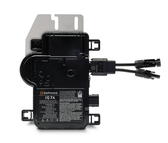 Although they are not technically considered hybrid inverters,
the Enphase Energy IQ series microinverters are the only inverters that will
work with the Enphase Ensemble battery line. In addition,
Enphase offers the only streamlined battery backup solution for microinverter systems.Older series microinverters such
as the M and S series, are not compatible with IQ series products including the
monitoring gateway, trunk cables and Ensemble battery. If you currently own a
solar energy system with their older microinverters, you will either need to
change out the microinverters, or add onto your existing system for the
purposes of grid connection and battery backup. Keep in mind that this system will
operate independently from the M or S series system, for monitoring you will
also need a new gateway.
Although they are not technically considered hybrid inverters,
the Enphase Energy IQ series microinverters are the only inverters that will
work with the Enphase Ensemble battery line. In addition,
Enphase offers the only streamlined battery backup solution for microinverter systems.Older series microinverters such
as the M and S series, are not compatible with IQ series products including the
monitoring gateway, trunk cables and Ensemble battery. If you currently own a
solar energy system with their older microinverters, you will either need to
change out the microinverters, or add onto your existing system for the
purposes of grid connection and battery backup. Keep in mind that this system will
operate independently from the M or S series system, for monitoring you will
also need a new gateway.
For those just beginning their research, microinverters are small inverters that are installed on the back of each of the solar panels. DC energy is converted into AC energy at the modular level, whereas string inverter systems run down a line to the inverter where the energy is converted. Microinverters are more efficient on average and have a longer warranty period than string inverter systems . They come in at a higher cost but have a range of benefits that come out to a similar is not better ROI period than string inverter systems.
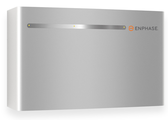 With the exception of the Enphase Ensemble line, all hybrid
battery systems will operate similarly to an on-grid system in the event of a blackout.
Your solar system will shut down and no longer power your home or send energy
to your battery backup unit. Any energy that is used to power the home comes
solely from the battery backup unit. This can be limiting to the number of appliances
that can be run as well as the duration that a viable energy supply will be available.
In these situations, the
Enphase Encharge system operates grid-agnostically,
your solar energy system will continue to operate as though it were connected
to the grid. You create your own micro-grid that can run for hours or even days
at a time
, when grid connection is established, the system automatically
switches back over to the grid.
With the exception of the Enphase Ensemble line, all hybrid
battery systems will operate similarly to an on-grid system in the event of a blackout.
Your solar system will shut down and no longer power your home or send energy
to your battery backup unit. Any energy that is used to power the home comes
solely from the battery backup unit. This can be limiting to the number of appliances
that can be run as well as the duration that a viable energy supply will be available.
In these situations, the
Enphase Encharge system operates grid-agnostically,
your solar energy system will continue to operate as though it were connected
to the grid. You create your own micro-grid that can run for hours or even days
at a time
, when grid connection is established, the system automatically
switches back over to the grid.
Related Articles:
OutBack SkyBox and Discover AES Battery System
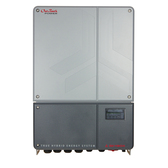 The OutBack SkyBox is more compatible than other hybrid
inverters on this list and can be used with any commonly available 48 VDC
battery back (lithium, flooded, AGM, gel, etc.). These inverters are limited to
5kW of backup power; therefore, they are recommended for systems under 7.5kW.
The inverter’s high PV input voltage rating allows for longer strings and less
wiring than competing systems. Like the other systems highlighted here, the SkyBox
system features backup power, grid support, net metering, non-export and
prioritized charging – this makes the system more flexible than past off-grid
OutBack Energy systems, which provided basic level monitoring and control over
the system.
The OutBack SkyBox is more compatible than other hybrid
inverters on this list and can be used with any commonly available 48 VDC
battery back (lithium, flooded, AGM, gel, etc.). These inverters are limited to
5kW of backup power; therefore, they are recommended for systems under 7.5kW.
The inverter’s high PV input voltage rating allows for longer strings and less
wiring than competing systems. Like the other systems highlighted here, the SkyBox
system features backup power, grid support, net metering, non-export and
prioritized charging – this makes the system more flexible than past off-grid
OutBack Energy systems, which provided basic level monitoring and control over
the system.
Like the SolarEdge StorEdge and SMA Storage inverter, the SkyBox is compatible with specific LG Chem lithium-ion batteries. However, the compatible LG batteries for the SkyBox and SMA Storage inverter can be difficult to source. Therefore, we will be using the more readily Discover OPzV Tublar Gel batteries for comparison purposes, this battery is the only one on this list that is non-lithium so keep that in mind as you make further comparisons. The OPzV batteries are available in 24V and 48V configurations and come with all necessary connectors and battery racking.
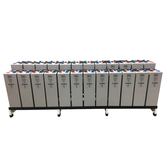 Discover batteries have the lowest cost of ownership among lead
acid technologies when utilized in a hybrid energy system
. The batteries are
engineered to deliver up to 80% of their rated capacity and a 50% depth of
discharge cycle life. This providers for superior deep cycling performance for both
residential and commercial applications. When paired with the OutBack SkyBox
the system should be tied to a residential application due to their size
limitation, for commercial hybrid applications, read on to SMA the SMA and BYD
hybrid set-up below. Discover also produces lithium-ion batteries that are compatible with Schneider Electric pre-wired off-grid systems, inverters and charge controllers. OutBack and Schneider systems require special attention to balance, so advice from a professional electrician is recommended for design purposes.
Discover batteries have the lowest cost of ownership among lead
acid technologies when utilized in a hybrid energy system
. The batteries are
engineered to deliver up to 80% of their rated capacity and a 50% depth of
discharge cycle life. This providers for superior deep cycling performance for both
residential and commercial applications. When paired with the OutBack SkyBox
the system should be tied to a residential application due to their size
limitation, for commercial hybrid applications, read on to SMA the SMA and BYD
hybrid set-up below. Discover also produces lithium-ion batteries that are compatible with Schneider Electric pre-wired off-grid systems, inverters and charge controllers. OutBack and Schneider systems require special attention to balance, so advice from a professional electrician is recommended for design purposes.
Related Articles:
SMA Storage Hybrid Inverter and BYD B-Box Battery System
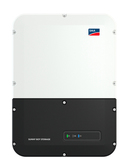 The SMA Storage inverter is the only inverter on this list
to independently offer battery backup capabilities. These hybrid inverters come
with up to 2000w of convenience power that can be drawn from in the event of a
power outage. This will allow for between 2-4 hours of backup power depending
on how much energy is being pulled from the inverter. This power can also be
pulled from during the evening and night hours when your solar array is not
generating power. If you live in an area where blackouts are uncommon, and are
just looking for a small backup unit, this SMA inverter may be a cost-effective
option for you.
The SMA Storage inverter is the only inverter on this list
to independently offer battery backup capabilities. These hybrid inverters come
with up to 2000w of convenience power that can be drawn from in the event of a
power outage. This will allow for between 2-4 hours of backup power depending
on how much energy is being pulled from the inverter. This power can also be
pulled from during the evening and night hours when your solar array is not
generating power. If you live in an area where blackouts are uncommon, and are
just looking for a small backup unit, this SMA inverter may be a cost-effective
option for you.
For those looking to go beyond a few hours of emergency blackout, SMA’s hybrid inverters pair with several lithium battery solutions including BYD Battery’s B-Box line. The line allows for three configurations in direct series connection of 2-4 battery modules: 2x B-PLUS-H (5.12kWh), 3x B-PLUS-H (7.68kWh) and 4x B-PLUS-H (10.24kWh) per base. Each base and 2-4 battery pairing are considered a single unit, there can be multiple units per system to allow for more battery backup. BYD batteries are compatible with both single and three phase systems making them more flexible than other lithium battery technologies on this list, which are compatible with single phase systems.
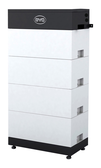 Currently, SMA America does not offer a stand-alone rapid
shutdown solution for their batteries, instead, their new modules call for “Smart
Modules” to be installed on each solar panel to meet rapid shutdown
requirements. These units do not enhance system performance like SolarEdge’s
optimizers, these units are strictly for safety purposes. If you currently own
an older SMA unit, you will not only need to replace the inverter to prepare for
battery back-up but install these units at each module. Any inverter made after
the -40 (discontinued 2019), will no longer be able to utilize the stand-alone
rapid shutdown unit. When planning your solar energy system, it is important to take such regulations into consideration during the planning stages of your project.
Currently, SMA America does not offer a stand-alone rapid
shutdown solution for their batteries, instead, their new modules call for “Smart
Modules” to be installed on each solar panel to meet rapid shutdown
requirements. These units do not enhance system performance like SolarEdge’s
optimizers, these units are strictly for safety purposes. If you currently own
an older SMA unit, you will not only need to replace the inverter to prepare for
battery back-up but install these units at each module. Any inverter made after
the -40 (discontinued 2019), will no longer be able to utilize the stand-alone
rapid shutdown unit. When planning your solar energy system, it is important to take such regulations into consideration during the planning stages of your project.
Related Articles:
SolarEdge StorEdge Hybrid Inverter and LG Chem RESU Battery System
 SolarEdge StorEdge hybrid inverters are paired with
optimizers to operate the inverter, battery backup unit and monitoring application.
Optimizers are units installed on the back of each module that optimize the
performance of individual solar panels within the array, like microinverters,
optimizers mitigate the energy loss caused through partial shading and other
factors. LG Chem produces a handful of batteries that are compatible with
specific hybrid inverter technologies.
The RESU10H is the unit you will want to
select when creating a SolarEdge hybrid system.
SolarEdge StorEdge hybrid inverters are paired with
optimizers to operate the inverter, battery backup unit and monitoring application.
Optimizers are units installed on the back of each module that optimize the
performance of individual solar panels within the array, like microinverters,
optimizers mitigate the energy loss caused through partial shading and other
factors. LG Chem produces a handful of batteries that are compatible with
specific hybrid inverter technologies.
The RESU10H is the unit you will want to
select when creating a SolarEdge hybrid system.
The LG Chem battery can only be installed by a certified installer in order to meet LG Chem’s battery warranty standard . The classes are open to everyone, so do-it-yourself homeowners can take the test as well as professional installers. The class is held every Thursday and lasts for about an hour, after, you must pass a short test with 100%. Your LG Chem certification will take up to 2 weeks to be sent to you, so keep this in mind when planning for your project. Your LG Chem battery cannot ship until your certification is on file, if you are in a time crunch, you may be able to obtain your certification number from LG Chem up to five days after completing the class by contacting them directly.
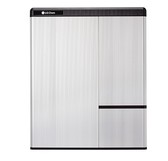 Unlike the Enphase Ensemble line, the solar modules in this
system will shut down in the event of a power outage. This means that your
solar panels will no longer be collecting energy and you will be relying solely
on your battery backup unit for power. At full charge, the LG Chem battery can
hold up to 10kWh or 10-12 hours depending on the battery’s state of charge and
the pull from the battery. This output rating is calculated based on a power
pull of 750-1000w per hour. For installers looking for a system to have emergency power for anticipated short power outages, this SolarEdge system is worth looking into, for frequent and long blackouts, the Enphase Ensemble battery may be better suited.
Unlike the Enphase Ensemble line, the solar modules in this
system will shut down in the event of a power outage. This means that your
solar panels will no longer be collecting energy and you will be relying solely
on your battery backup unit for power. At full charge, the LG Chem battery can
hold up to 10kWh or 10-12 hours depending on the battery’s state of charge and
the pull from the battery. This output rating is calculated based on a power
pull of 750-1000w per hour. For installers looking for a system to have emergency power for anticipated short power outages, this SolarEdge system is worth looking into, for frequent and long blackouts, the Enphase Ensemble battery may be better suited.
Related Articles:
Hybrid Inverter and Battery Cost Comparison
The following table highlights the average cost of the hybrid inverter and battery backup unit only. This does not include the cost of additional equipment such as monitoring units or auto transformers. The systems are sized to 7kW to provide a fair side by side comparison.
*Pricing as of posting of this article, to obtain up-to-date pricing, click on the links provided throughout the images above.
Solaris Recommendations
In terms of cost, the SMA Storage inverter and BYD B-Box have the lowest initial investment cost followed by SolarEdge. OutBack Power comes in well above the rest in combination with the Discover batteries, if paired with the correct LG Chem battery they become more affordable. In addition, SolarEdge and SMA will also require smart modules, putting them closer to Enphase's price point, but still lower when fully evaluated. This puts Enphase at the top rage of hybrid options in terms of cost, however, it is also important to consider your future ROI and the lifetime expenses of the system. Enphase microinverters have a 25 year warranty whereas string inverters average around 10, this means that string inverters will likely need to be replaced at some point during the lifetime of your solar modules. In addition, Enphase's grid-agnostic features puts them in different technological class than other hybrid systems.
Of the available options, the most popular are the Enphase IQ and Ensemble, followed by the SolarEdge and LG Chem RESU. This is largely due to the popularity of the manufacturers and the reliability of their respective hardware. The manufacturer's prosecutes are easy to install, making them a popular choice for DIY home owners and installers, and the in-depth monitoring software makes energy management and maintenance simple. SMA is a solid option for solar energy systems that can be installed at a south facing angle with no shade. This will ensure that the system is working at its optimum efficiency, without the use of optimizers or microinverters, shading and low sunlight can have a greater impact on the energy output of your system.
It is important to identify how hybrid systems and system components are different in order to determine how those differences can affect your current and future solar energy performance. For projects that are going to be installed in phases, it is important to ensure future compatibility so the products you need will be available for future solar energy use and battery backup power additions. Therefore, selecting a manufacturer with established technology is important. Hybrid solar energy systems can also significantly reduce your ROI period from your ability to tap into your battery supply during the hours the system is not operational, the solar energy systems of the future are likely to be hybrid.
Ready to Get Started?




